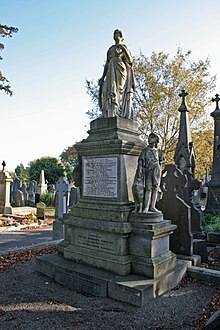John O'Mahony
Despite coming from a reasonably wealthy family and being well educated, the primary pursuit of O'Mahoney's life was that of Irish Independence from the United Kingdom, a calling that ultimately left him in poverty.
However, following the capture of leaders such as Smith O'Brien, Thomas Francis Meagher, James Stephens and Terence Bellew MacManus, it became apparent the effort was doomed.
O'Mahony's notes are copied from O'Donovan's Four Masters, and it was on this ground that Hodges & Smith procured an injunction against the sale of the book in the United Kingdom.
[3] The mental strain to which O'Mahony was subjected in the preparation of this work, which brought him no pecuniary gain, affected his reason, and he was removed by his friends for a short time to a lunatic asylum.
[5][1][2] The close of the Civil War in the spring of 1865 gave a great impetus to the Fenians, owing to the number of Irish-American soldiers that were disbanded and anxious to see service elsewhere.
Bell, a committed supporter of the Radical Republican agenda of black franchise and Reconstruction, repeatedly criticized O'Mahony's branch of the Fenian Brotherhood, dubbing it the "bloated carcass of gaseous Manhattanism."
He argued that O'Mahony was indifferent to the need to "cleanse" the spirits of the Irish in America: "Let our people fling off the scales of bigotry and declare that all men are entitled to 'life, liberty, and happiness.
'"[8] He devoted the last years of his life to literary pursuits, but suffered from ill health, and he had a hard struggle to secure the bare means for subsistence.
[5] He died in New York City in 1877 and soon after his death his remains were taken to Ireland and interred with the honors of a public funeral in Glasnevin Cemetery in Dublin.
